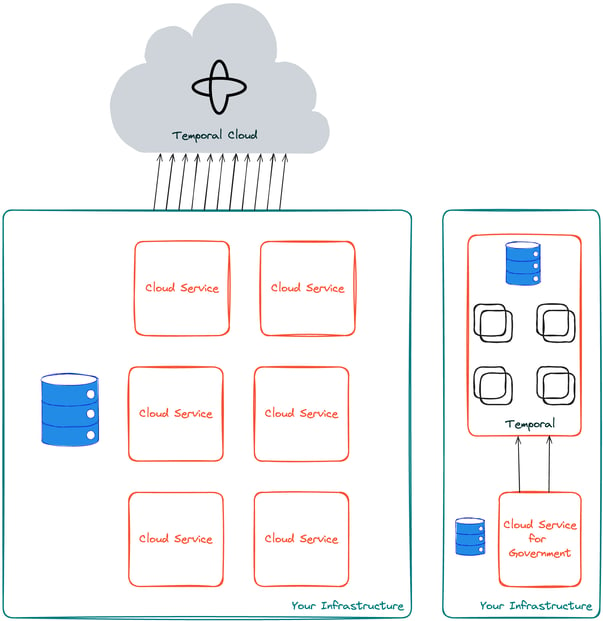Implementing Temporal Cloud can present challenges for organizations offering cloud services that may be used by the federal government. One of the largest buyers of cloud technology, the federal government requires cloud services to be certified by the Federal Risk and Authorization Management Program (FedRAMP®). Each Cloud Service Offering (CSO) must have an independent authorization.
Organizations looking to leverage Temporal within their FedRAMP-authorized cloud services can host Temporal’s services in-house. This post will explain why it may be useful to use Temporal Cloud alongside a self-hosted instance for any Cloud Service Offerings that do not require FedRAMP authorization.
FedRAMP® Overview
The Federal Risk and Authorization Management Program (FedRAMP®) is a government-wide program that provides a standard approach to assessing security, authorization, and continuous monitoring for cloud services. FedRAMP is backed by standards and guidelines from the National Institute of Standards and Technology (NIST) and a process for getting Cloud Service Offerings authorized, either through an individual government agency or the Joint Authorization Board. This unified approach to authorization means that once a CSO is authorized, it can be used by any agency throughout the US Government.
Augmenting Self-Hosted Temporal With Temporal Cloud
Temporal’s Cloud Service Offering, Temporal Cloud, is not currently FedRAMP certified. If you wish to leverage Temporal’s capabilities to power your CSO, you will need to explore self-hosting Temporal’s services. Operating Temporal at scale comes with unique challenges, as you’re ultimately running a highly scalable, multi-tenant, distributed system with 4 distinct services and a database. There are lots of essential metrics you need to be aware of to appropriately size and scale your self-hosted Temporal instance.
Despite these unique challenges, a self-hosted Temporal instance can be a huge benefit to your organization, allowing you to build much more reliable systems while delivering more features, faster. However, if you have Cloud Offerings that are not being used by the federal government, or internal tools that are not visible to the cloud, you may want to consider using Temporal Cloud for those and reserving your self-hosted Temporal instance for your FedRAMP authorized CSOs.
For example, if you are building a CRM + Analytics + AI™️ Service and would like to offer CRM + Analytics + AI for Government™️, this is what your architecture might look like with this approach:

Benefits of Temporal Cloud
Temporal Cloud offers the same reliability and swift feature delivery as a self-hosted Temporal instance with several additional benefits.
Temporal Cloud is architected to scale to meet the demand of its heaviest users — including Snap, Netflix, Yum! Brands, and many more — it has been performance tested to process over 150k actions/second or 100B actions/month. Temporal Cloud offers a unique, elastic control plane that defaults to 200 actions/second for a Cloud namespace and automatically scales based on load. Temporal Cloud also has a custom persistence layer designed to handle the write-heavy architecture of Temporal’s event-sourcing model and meet the highest transactional throughput. Temporal Cloud’s control plane and custom persistence layer allow it to be better, faster, and cheaper than a self-hosted instance.
Support
Being able to hit your performance and scalability goals when things are going well is very important, but the ability to recover from issues when they happen is even more crucial. Using Temporal Cloud significantly reduces the operational overhead for your organization. Temporal Cloud’s support agreement ensures that you have an on-call engineer 24/7 with an SLA of under 1 hour.
Automatic Updates
Temporal has a new release approximately every six weeks, and for the most part, each release has to be applied sequentially. With Temporal Cloud, you’re automatically kept up-to-date without any downtime for your service.
Summary
For organizations offering cloud services to the federal government, self-hosting Temporal is a great solution for any Cloud Service Offering that is FedRAMP-authorized. For other services or non-cloud internal tools, using Temporal Cloud can provide many benefits, including performance and scalability, support, and automatic updates.
Need more help with Temporal?
Bitovi can help with your Temporal implementation. Our friendly team of Temporal Consulting experts would be happy to walk you through any step of your orchestration. Schedule a free consultation to get started.